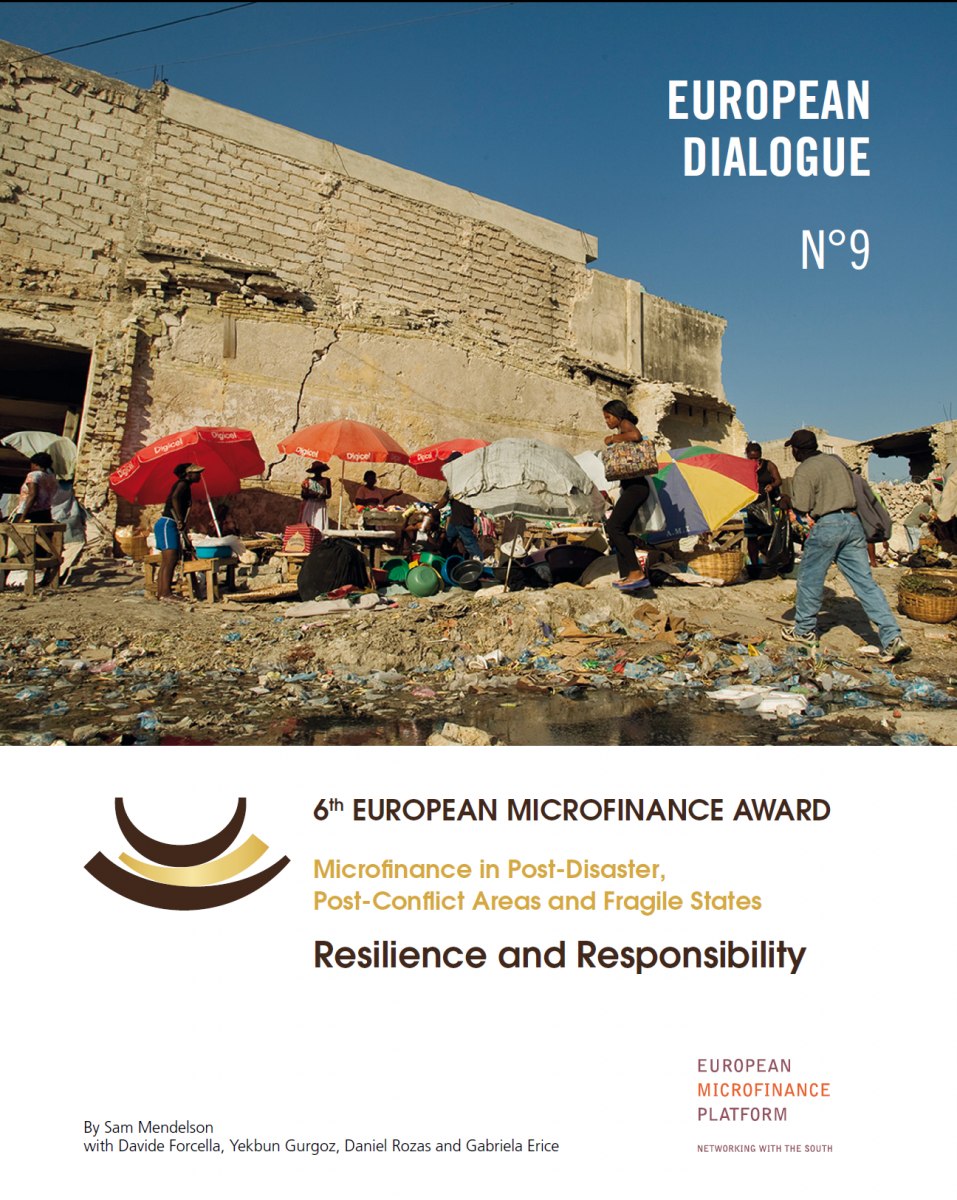 We’re delighted to announce the release of the 9th edition of the European Dialogue, a periodic and in-depth analysis of a particular important area of innovation in microfinance. Since the first in 2008, several of the previous editions have paralleled the subjects of the now-annual European Microfinance Award. This year, too, the Dialogue is focused on the most recent Award, recognising excellence in microfinance in post-disaster/post-conflict areas & fragile states.
We’re delighted to announce the release of the 9th edition of the European Dialogue, a periodic and in-depth analysis of a particular important area of innovation in microfinance. Since the first in 2008, several of the previous editions have paralleled the subjects of the now-annual European Microfinance Award. This year, too, the Dialogue is focused on the most recent Award, recognising excellence in microfinance in post-disaster/post-conflict areas & fragile states.
The publication is entitled Resilience and Responsibility, and written by Sam Mendelson, with support from Davide Forcella and Yekbun Gurgoz – the consultants who designed the Award methodology and oversaw the selection process – and e-MFP’s own Daniel Rozas and Gabriela Erice. It can be read online here and downloaded as a PDF here.
The 2015 Award which Resilience and Responsibility draws upon looked for institutions that demonstrate an effective strategy to increase both their own resilience and that of vulnerable clients, while putting in place responses that provide for their immediate, medium- and long-term needs. It sought to recognise excellence by answering the question: how can MFIs working in the most difficult environments balance their financial and social responsibilities, protecting the sustainability of the institution as well as the lives and livelihoods of their clients?
A post-disaster or post-conflict context has many effects. It increases the risk of poverty traps over the short and long term. Poor households’ incomes decrease, productivity of economic activities decreases, investments are impaired, market opportunities are reduced, trust and social relations are weakened, and health, housing and shelter conditions are worsened. That is, poverty is not just a household-level consequence of a crisis; but the whole community and economic value chain is affected; the re-establishment of normal socio-economic conditions is undermined. A negative feedback loop of poverty traps can emerge: incomes fall and become more volatile; productivity decreases; markets worsen; infrastructure decays; movement of goods deteriorates; and social cohesion suffers.
Microfinance institutions suffer in crises too. Non-performing loans can skyrocket. Deposit-taking institutions may see a run on savings for which they are ill prepared. There is pressure to forgive debt, to write off loans, even as portfolio quality remains a key driver of funding: how to balance the need for future outside liquidity against the welfare of borrowers struggling today?
Resilience and Responsibility presents the key issues which emerged during the assessment phase leading up to the evaluation of the three finalists last November, and extracts nine factors which exemplify the emerging best practice in this field: Immediate Humanitarian Response; Adapting Core Financial Services; Awareness Building & Psychological Support; Innovating With Products; Planning Ahead; Making Partnerships; Taking Care of Staff; Ensuring Financial Sustainability; and Leading by Example.
The paper begins with a summary background of the particular challenges that MFIs face in post-crisis contexts, how those challenges vary depending on whether the crisis is acute or protracted, and the particular opportunities for MFIs to make a positive impact, increasing the resilience of clients and the institutions themselves in the face of extreme vulnerability.
The Dialogue also provides case examples from among the ten Award semi-finalists of how institutions can match these factors to a range of contexts – from sudden natural disasters, to on-going civil conflict – and includes profiles of each of the ten organisations that made it to the semi-final stage.
This edition of the European Dialogue is a fascinating read, and has been put together to be especially accessible to a broad range of stakeholders of differing expertise and background, and will be particularly valuable as a one-stop, introductory tool for those interested in knowing more both about this critical and young sub-sector of microfinance, and the institutions providing services to clients in the most difficult circumstances imaginable.

Leave a comment